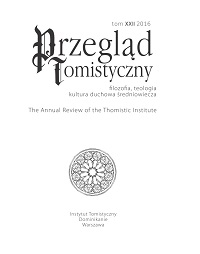ZDENKA HLEDIKOVA, Synodal and Reform Preaching as Part of the Development Process in Late Medieval Bohemia

Volume XXII: 2016
Philosophy — Theology— Spiritual Culture of the Middle Ages
ISSN 0860-0015
e-ISSN 2544-1000
SUMMARY
Rapid development caused by, among other things, the constitution of the University of Prague and the establishment of the local church province, occurred in the mid-fourteenth century in the Kingdom of Bohemia, the cradle of the so called First Reformation (that is, Hussitism). The founding of the University, along with the activity of a widely-spread parish network, should have become the basis of the country’s religious and cultural life. However, the parish clergy was poorly formed.
Frequent diocesan synods and, especially, synodal preaching became the main instruments for improving the formation of priests under the guidance of the Archbishop. Synodal sermons were designed to serve as a exemplars or patterns for what priests might preach in their own parishes. The ideas contained in these synodal sermons were thus copied repeatedly. They spread quickly to all parts of the Kingdom.
From the 69 documented synods of Prague up to the beginning of the Hussite period, 24 sermons from the years 1365–1407 can be attributed to the synodal program. These were presented by 12 different preachers, always appointed by the Archbishop.
A synodal sermon belongs to the “sermones ad clerum” genre, of course. We know the dates of each synod by the feats that occurred during it (for instance, the Feats of Saint Vitus or Saint Luke), and the themes of the sermons were inspired by the liturgical texts of those feasts.
The article follows both the content and the formal development of all sermons researched, ranging from the academic or scholarly sort of sermon, in which abstractions such as Good and Bad are used, to more vivid and nearly poetic sermons that often make reference to the negative experience of listeners and refer disdainfully to contemporary “decadence”. This latter type of sermon was particularly prominent in the late 1380s and early 1390s.
The oldest three sermons, from the 1360s, are unique because of their author, the reform preacher Jan Milíč of Kroměříž. He was atypical because he was not part of the academic community; the other preachers selected by the Archbishop were usually university professors. Most often, the preachers were theologians. In one case, a professor of canon law was invited to speak. A Dominican lecturer was given the pulpit once, too.
Beginning in the 1380s, synodal sermons sometimes referred to important ecclesiastical controversies (like the one surrounding indulgences) or legal controversies (such as the debate about escheatage), but they still conveyed the basic moralist attitude inspired by the treatise De Vita et Honestate Clericorum. In the last few sermons authored by John Hus, Wycliffe’s thoughts are discernable. The development of synodal preaching was finished by an arenga, compiled for the Synod of 1413, which was summoned by the King.
In the appendix of this article there is an index and overview of the synod terms connected with the sermons, including the number of known manuscripts, a list of sermons whose dates are unknown that are not covered in detail in this article, and references to other sources on the topic of synodal preaching in Prague.
